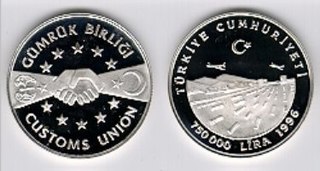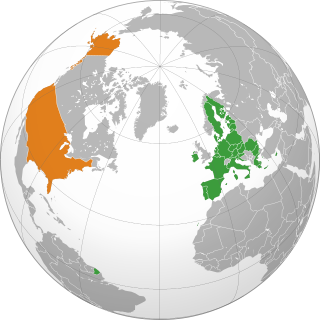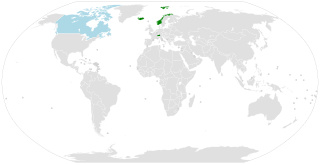
The Free Trade Area of the Americas (FTAA) was a proposed agreement to eliminate or reduce the trade barriers among all countries in the Americas, excluding Cuba. Negotiations to establish the FTAA ended in failure, however, with all parties unable to reach an agreement by the 2005 deadline they had set for themselves.
A European Union Association Agreement or simply Association Agreement (AA) is a treaty between the European Union (EU), its Member States and a non-EU country that creates a framework for co-operation between them. Areas frequently covered by such agreements include the development of political, trade, social, cultural and security links.

The European Union–Turkey Customs Union is a trade agreement between the European Union (EU) and Turkey. The agreement came into effect on 31 December 1995, following a 6 March 1995 Decision of the European Community–Turkey Association Council to implement a customs union between the two parties. Goods may travel between the two entities without any customs restrictions. The Customs Union does not cover essential economic areas such as agriculture, services or public procurement.

Transatlantic relations refer to the historic, cultural, political, economic and social relations between countries on both side of the Atlantic Ocean. Sometimes it specifically means relationships between the Anglophone North American countries, and particular European countries or organizations, although other meanings are possible.

A preferential trade area is a trading bloc that gives preferential access to certain products from the participating countries. This is done by reducing tariffs but not by abolishing them completely. It is the first stage of economic integration.

Relations between the European Union and the United States began in 1953, when US diplomats visited the European Coal and Steel Community in addition to the national governments of its six founding countries. The two parties share a good relationship which is strengthened by NATO, cooperation on trade, and shared values.
The European Commissioner for Trade is the member of the European Commission responsible for the European Union's common commercial policy.

The United States is party to many free trade agreements (FTAs) worldwide.

The Canada–European Free Trade Association Free Trade Agreement is a trade agreement between Canada and the member states of the European Free Trade Association. Signed in Davos, Switzerland on January 26, 2008, it came into effect on July 1, 2009. The agreement is aimed at eliminating all tariffs on goods between Canada and EFTA members.

The Comprehensive Economic and Trade Agreement (CETA) is a free-trade agreement between Canada and the European Union and its member states. It has been provisionally applied, thus removing 98% of the preexisting tariffs between the two parts.
Investor–state dispute settlement (ISDS) or investment court system (ICS) is a system through which countries can be sued by foreign investors for certain state actions affecting foreign direct investment (FDI). This system most often takes the form of international arbitration between a foreign investor and the nation receiving the FDI.

The European Union has concluded free trade agreements (FTAs) and other agreements with a trade component with many countries worldwide and is negotiating with many others. The European Union negotiates free trade deals on behalf of all of its member states, as the member states have granted the EU has an "exclusive competence" to conclude trade agreements. Even so, member states' governments control every step of the process :

Mexico and the European Economic Community (EEC) signed an agreement intending to foster economic and trade relations on 15 July 1975. Mexico and the European Union (EU) have had a free trade agreement since 2000 and the two benefit from high investment flows.

Relations between the European Union (EU) and Japan date back to 1959. They have a strong trade relationship, particularly in investment flows.

The Transatlantic Trade and Investment Partnership (TTIP) was a proposed trade agreement between the European Union and the United States, with the aim of promoting trade and multilateral economic growth. According to Karel de Gucht, European Commissioner for Trade between 2010 and 2014, the TTIP would have been the largest bilateral trade initiative ever negotiated, not only because it would have involved the two largest economic areas in the world but also "because of its potential global reach in setting an example for future partners and agreements".

The Trade in Services Agreement (TiSA) was a proposed international trade treaty between 23 Parties, including the European Union, United Kingdom and the United States. The agreement aimed at liberalizing the worldwide trade of services such as banking, healthcare, and transport. Criticism about the secrecy of the agreement arose in June 2014, after WikiLeaks released a classified draft of the proposal's financial services annex, dated the previous April. Another release took place in June 2015, and another took place in May 2016. As of 2021, no such agreement has ever been reached.

The free trade agreements of Israel represent Israel's cooperation in multinational trade pacts and participation in the global economy. Israel's first free trade agreement was signed in 1985 with the United States of America. Since then, Israel has signed 14 free trade agreements with 46 countries and economic blocks such as the European Union, the European Free Trade Association and Mercosur.

Frank Bsirske is a German trade unionist and politician and of Alliance 90/The Greens who has been serving as a member of the Bundestag since 2021. From 2001 to 2019, he was the chairman of the United Services Trade Union (ver.di).














